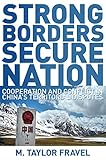Strong Borders, Secure Nation : Cooperation and Conflict in China's Territorial Disputes / M. Taylor Fravel.
Material type: TextSeries: Princeton Studies in International History and Politics ; 111Publisher: Princeton, NJ : Princeton University Press, [2008]Copyright date: ©2009Edition: Course BookDescription: 1 online resource (408 p.) : 7 line illus. 7 tables. 16 mapsContent type:
TextSeries: Princeton Studies in International History and Politics ; 111Publisher: Princeton, NJ : Princeton University Press, [2008]Copyright date: ©2009Edition: Course BookDescription: 1 online resource (408 p.) : 7 line illus. 7 tables. 16 mapsContent type: - 9780691136097
- 9781400828876
- 327.51 22
- DS737 .F73 2008eb
- online - DeGruyter
- Issued also in print.
| Item type | Current library | Call number | URL | Status | Notes | Barcode | |
|---|---|---|---|---|---|---|---|
 eBook
eBook
|
Biblioteca "Angelicum" Pont. Univ. S.Tommaso d'Aquino Nuvola online | online - DeGruyter (Browse shelf(Opens below)) | Online access | Not for loan (Accesso limitato) | Accesso per gli utenti autorizzati / Access for authorized users | (dgr)9781400828876 |
Browsing Biblioteca "Angelicum" Pont. Univ. S.Tommaso d'Aquino shelves, Shelving location: Nuvola online Close shelf browser (Hides shelf browser)

|

|

|

|

|

|

|
||
| online - DeGruyter In the Moment of Greatest Calamity : Terrorism, Grief, and a Victim's Quest for Justice - New Edition / | online - DeGruyter Reforms at Risk : What Happens After Major Policy Changes Are Enacted / | online - DeGruyter Uncivil Disobedience : Studies in Violence and Democratic Politics / | online - DeGruyter Strong Borders, Secure Nation : Cooperation and Conflict in China's Territorial Disputes / | online - DeGruyter Moral Gray Zones : Side Productions, Identity, and Regulation in an Aeronautic Plant / | online - DeGruyter A Pinnacle of Feeling : American Literature and Presidential Government / | online - DeGruyter Five Fictions in Search of Truth / |
Frontmatter -- Contents -- Illustrations -- Tables -- Acknowledgments -- Abbreviations -- Introduction -- Chapter One. Cooperation and Escalation in Territorial Disputes -- Chapter Two. Cooperation in Frontier Disputes in the 1960s -- Chapter Three. Cooperation in Frontier Disputes in the 1990s -- Chapter Four. Escalation in Frontier Disputes -- Chapter Five. Homeland Disputes -- Chapter Six. Offshore Island Disputes -- Conclusion -- Appendix. Overview of China's Territorial Disputes -- Bibliography -- Index
restricted access online access with authorization star
http://purl.org/coar/access_right/c_16ec
As China emerges as an international economic and military power, the world waits to see how the nation will assert itself globally. Yet, as M. Taylor Fravel shows in Strong Borders, Secure Nation, concerns that China might be prone to violent conflict over territory are overstated. The first comprehensive study of China's territorial disputes, Strong Borders, Secure Nation contends that China over the past sixty years has been more likely to compromise in these conflicts with its Asian neighbors and less likely to use force than many scholars or analysts might expect. By developing theories of cooperation and escalation in territorial disputes, Fravel explains China's willingness to either compromise or use force. When faced with internal threats to regime security, especially ethnic rebellion, China has been willing to offer concessions in exchange for assistance that strengthens the state's control over its territory and people. By contrast, China has used force to halt or reverse decline in its bargaining power in disputes with its militarily most powerful neighbors or in disputes where it has controlled none of the land being contested. Drawing on a rich array of previously unexamined Chinese language sources, Strong Borders, Secure Nation offers a compelling account of China's foreign policy on one of the most volatile issues in international relations.
Issued also in print.
Mode of access: Internet via World Wide Web.
In English.
Description based on online resource; title from PDF title page (publisher's Web site, viewed 30. Aug 2021)


